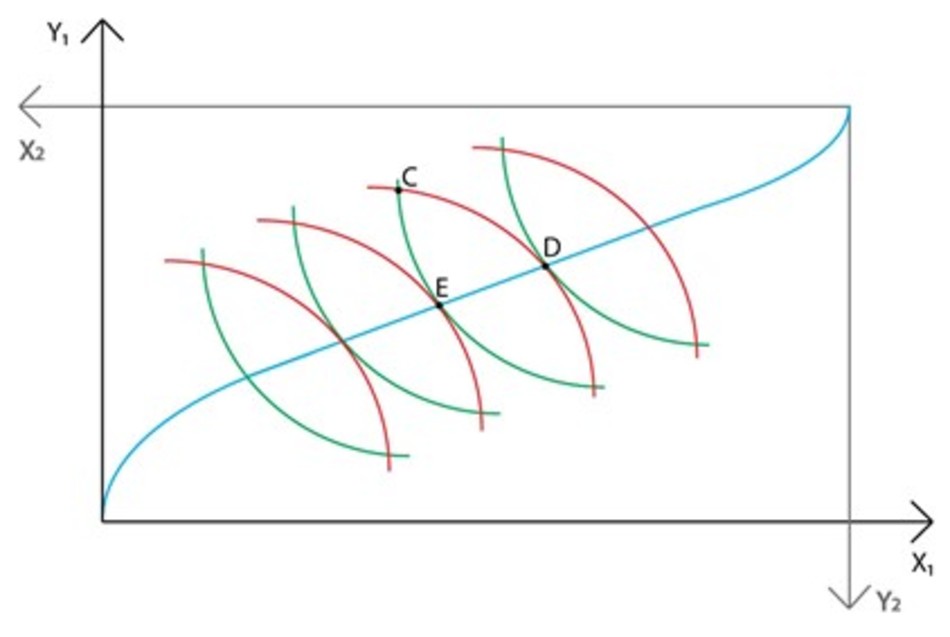
KONNOR VON EMSTER – FEBRUARY 18TH, 2020
EDITOR: RAINA ZHAO
While crises like natural disasters and financial cyber attacks can significantly damage an economy, very few events can completely halt the global economy. A natural disaster often only disrupts the local area it damages, while life continues on normally in other parts of the world, such as what happened with Hurricane Katrina in 2005. Cyber attacks, while potentially global in scope, would likely not cause an economy to grind to a halt, as many functions can be taken offline in an emergency and person to person transactions can still occur. Pandemics, on the other hand, are one of the few events with the potential for complete global disruption.
Pandemics occur when highly contagious diseases spread to humans and then spread around the world. In the case of the current Coronavirus outbreak, many cities, most notably Wuhan, China, have entered lockdown in an effort to prevent its spread. While public health organizations as well as the Chinese government are attempting to stop the virus in China, the virus is spreading rapidly, with hundreds of cases documented each day.
In this situation, the major economic impact of factories halting production and people being quarantined in their homes is evident but the extent of such impacts has not fully been analysed until now. Does this pandemic have the power to completely disrupt the global economy or will the consequences only be local in scope?
What is the Coronavirus?
The Coronavirus that is sweeping China is an individual strain of disease in the Coronavirus classification of viruses including the common cold, bronchitis, and pneumonia. Little is known about its lethality, although it appears to be much less deadly than Severe Acute Respiratory Syndrome (SARS) or Middle East Respiratory Syndrome (MERS), which had lethality rates at 10% and 34% respectively.
However, there are now about 45,000 confirmed cases and nearly 1000 confirmed deaths, far surpassing the death toll of the SARS outbreak of 2003. While a quarantine has been implemented to prevent the spread of the disease, the disease has spread to Europe and America, including 12 confirmed cases in the US, with no deaths. The disease’s rapid surge has coincided with China’s largest holiday, Chinese New Year, where people from around the country travel and visit family. As a result, China placed a travel ban in an attempt to prevent the spread of the disease. This also includes banning Chinese New Year festivities in Wuhan and Beijing in an effort to prevent public gatherings that could spread the disease.
Included in these travel and event restrictions, Wuhan itself has been placed on lockdown. All transit (flights, trains, buses, and highways) has been suspended as of January 23 2020. On January 26th, one resident reported text messages from the government allowing only certain people to leave their residences and pick up supplies. The economic impact of such a lockdown is great, particularly in light of the fact that Wuhan itself is a large city known for its commercial and manufacturing interests, located in the providence of Hubei. The city has over 11 Million residents and is one of China’s technology and automotive manufacturing hubs.
A Brief History of Pandemics
Past pandemics, while extraordinarily infrequent, have resulted in substantial decline in economic growth during the periods in which they were active. The Spanish Flu of 1918, one of the most severe in history, saw large swaths of markets shut down throughout the globe due to a large number of workers being infected, thereby causing basic services such as mail delivery, telephone operation, factory production, and garbage disposal to become hindered. Similarly, SARS’s economic effect, the likes of which Coronavirus has already surpassed, led to an economic loss in mainland China estimated to be between $12.3 and $28.4 billion USD, ultimately representing a 1% decline in Chinese GDP. An article from Meltzer, Cox, and Fukuda analysed the economic impact of a pandemic-like occurrence in 1999. Their results confirmed the cost-effectiveness of vaccines in lessening the economic impact which was estimated at between $71.3 and $166.5 Billion. Such studies exemplify the extreme impact that this would have on output, not to mention the effects the study was not able to account for such as social and commercial ramifications.
Current Economic Effects
Needless to say, pandemics are very bad for an industrial economy, as people are immediately and uncontrollably removed from the workforce for either a temporary or permanent amount of time. Wuhan, as a city built for commerce and trade, will be hit hard by this epidemic. The only questions left are what areas of the economy will be disrupted and how far the virus and its effects will spread.
Auto manufacturing is chief among the disrupted industries as entire production lines for Honda, Nissan-Renault, and GM have come to a halt. This lost production may lead to increased prices for consumers and lost wages for factory workers. China’s state-owned auto manufacturer, Dongfeng Motor Corp, faces the most extreme difficulty as their entire headquarters is stationed in Wuhan, as is much of their manufacturing. Tesla’s recently built Shanghai factory reported a necessary slow down in production and delivery of vehicles due to Coronavirus. Due to all these factors, Gasgoo Auto Research Institute reported a projected 3% to 6% drop in auto sales during 2020.
China’s “Made in China 2025” high tech initiative will also be disrupted, as the movement has largely centralized itself in Hubei through strategic centralization of semiconductor, smartphone companies, and industrial components. Manufacturing will suffer due to a twofold decrease in labor supply. Not only are there sick workers who cannot show up to work, there many still who cannot return from their Spring Festival Travel due to the travel ban, as reported on by a semiconductor industry insider. This has caused many companies to make the painful decision to partially or fully shut down manufacturing operations.
This instigates another point, which is that much of the business is derived from foreign corporations or foreign agreements. With the travel ban and airline service suspended, business transactions cannot be had in person, leaving significantly less effective phone calls and emails the only option. This situation tests the trust companies must have in their subsidiaries and third party manufacturers, when dealing with quality control and actuarial management.
A more direct economic effect will be airline companies losing business over decreased travel to China. The CDC advised travelers to avoid all non-essential trips to China. Several airlines including United, Air Canada, British Airways, and Air India have begun canceling flights to adjust for the decreased demand. This has been exacerbated by the US’s ban on travelers with recent travel to China, essentially cutting a large tourist segment from the US. These route cancellations represent small (2-8%) but real cuts to US airline revenues.
Ripple effects around the world on supply chains may become evident in the coming months. With shortages in production certain intermediate goods made in Wuhan such as their acclaimed semi-conductors will be scarce, leading to product specific inflation. A severe pandemic could lead to worsening transport problems with sickly transit workers but this does not seem to be the case as the epidemic is mostly centered in China.
An often unmeasurable effect pandemics have to the global economy is that of investor confidence. Investor confidence is a hard trait to measure as millions of investors around the world partake in individual financial transactions that ultimately conglomerate in market prices and the health of the global economy. Therefore a relatively unimportant or small impact that spooks many investors could cause a momentary downturn in the market. Such fears may be sound in the technology and auto companies directly involved in the crisis, but a global downturn may result from lost investor confidence over fear of the virus’s spread. It is a known fact that many people disproportionately exaggerate unlikely risks from common ones, such as the classic shark attack verses traffic incident fallacy. Therefore a relatively controlled virus like Coronavirus that has killed just over 1,000 people is greatly exaggerated from the common flu which has killed 10,000 people in the 2019-2020 season alone.
This ridiculousness is not isolated to theory either. Hot Pot restaurant shares took a tumble in response to a reported story that 9 people were infected in Hong Kong after sharing a hot pot. Many Asian indexes have fallen in the wake of Coronavirus, even in countries marginally affected by it. This could be for several different reasons, including fear that the virus could spread to other economies, China’s temporary downturn may spillover, and manufacturing supply chains will be disrupted, decreasing production. Because it is difficult to estimate how far the epidemic will spread, determining whether markets are priced in or not cannot be accurately estimated.
Health Care System Under Strain
While most of the time disease is a morbidly good business for hospitals, it seems this is not the case in Wuhan as of yet. While it is not entirely clear the full extent of the situation, there are stories of overcrowded hospitals where only the sickliest of patients are admitted. The pace of new cases is outstripping the capacity of all of the hospitals, which China has responded by outright building more hospitals, having completed two in just over a week. Even then patients are being turned away as there are simply not enough beds, with reports of people being treated from the disease outside and in their cars. It is evident the Chinese healthcare system did not have the capacity for such a virus. China’s healthcare is nationalized and thus the government controls supply to fit demand. There is thus no profiteering to be made from this virus as there may be in other healthcare systems. Either way, the totalitarian control and legitimacy of China’s state government is under question by this gap in services, with many complaining about the poor quality of care their relatives are receiving.
One industry that is benefitting heavily from the Coronavirus are antiviral pharmaceutical manufacturers. As the virus currently does not have a standard treatment, healthcare professionals have been required to improvise, leading them to try antivirals typically reserved for HIV patients. When a Washington man became ill with Coronavirus, doctors turned to the experimental Remdesivir, produced by Gilead Sciences. Remdesivir was originally produced to combat Ebola, but has shown to be effective as an antiviral treatment. Gilead Sciences insists it is only for experimental use and “has not been demonstrated to be safe or effective for any use” in a statement released on January 31st. While Gilead is not expected to profit much off of Coronavirus, its stock still realized a 4% gain after their press release on Coronavirus.
Conclusions
The impact of Coronavirus is far from well-defined. Current analyst predictions place the effects on the order of a 0.5-1% reduction in GDP, although this is dependent on the severity and longevity of the virus. Further devaluations may be necessary depending on the longevity and spread of the epidemic. The longevity aspect is what will start to hurt business inventory and supply, thus causing a contraction in production and in the local economy of places affected by the epidemic. The epidemic in its most extreme form is only centralized to Wuhan’s state of Hubei, although further expansion would affect other economies. Luckily this has not been the case as it has not reached a pandemic status, and does not appear to be spreading globally.
There is yet another silver lining to the Coronavirus crisis. The pandemic has caused companies to rethink their supply chain management and decentralization of parts procurement, such as that of many automakers and tech companies, notably Honda in this article, choosing to shift production to other foreign plants. It may also push companies to plan more succinct and complete business continuity plans, protecting consumer goods against future crises. While this may not be as important for auto manufacturers or technological products, business continuity plans are crucial for industries such as agriculture, utilities, and pharmaceuticals, all services many people would not be able to live without for an extended period of time.
Part of China’s strife also exemplifies the need for developing healthcare systems to be prepared for local epidemics at any point in time. One could also argue it is up to the global public health system to support healthcare systems that are not able to fend for themselves. In China’s case there were not enough gowns, googles, or masks to protect all the available healthcare workers, nor beds to keep up with the incredible spread of the disease.
Another consideration for businesses is how to decentralize and move online when a whole city is quarantined. While this is obviously not the solution all businesses can rely upon, especially when it comes to manufacturing jobs, service and managerial jobs can often be completed over alternate means of communication. While difficult, performing vital tasks over email, phone, and video calling may be preferable to completely shutting down a business to ride out the epidemic.
While it is uncertain how far the Coronavirus will spread, it is evident that it will affect the Chinese economy the most, followed by some rippling effects for the world economy.
Featured Image Source: MarketWatch
Disclaimer: The views published in this journal are those of the individual authors or speakers and do not necessarily reflect the position or policy of Berkeley Economic Review staff, the Undergraduate Economics Association, the UC Berkeley Economics Department and faculty, or the University of California, Berkeley in general.



